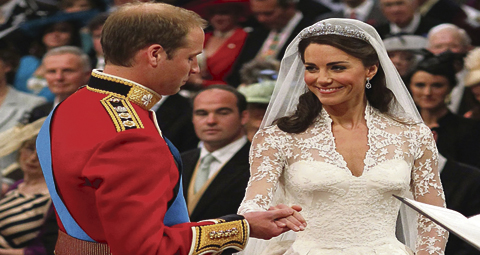
Anti-Catholic succession law must go
— Recent reforms to UK laws are but a by-product of PM’s pandering, the fact remains that Catholics are still barred from the throne
By Gerald Warner
Suddenly, David Cameron has become deeply concerned about the rights of the unborn; but pro-lifers should not get too excited. The unborn—indeed wholly imaginary—child about whom the Prime Minister is so exercised is not some baby being butchered in an abortion clinic, but the hypothetical daughter of the Duke and Duchess of Cambridge. If the new royal couple’s first child is a girl, Mr Cameron wants the law of succession changed so that she becomes heir to the throne instead of any younger brother born later.
The Prime Minister’s advisers have told him he is losing the female vote, so he is looking for some ‘sexist’ discrimination to reform, as a grandstanding gesture to women. Because the current succession law, anchored by the Act of Settlement of 1701, gives preference to younger brothers over older sisters, Mr Cameron has seized on this as a personal crusade, hoping at the same time to hitch a ride on the bandwagon of celebrity attaching to ‘Wills and Kate.’ Catholics might have welcomed this initiative, since it means revisiting the Act of Settlement and it would obviously be unthinkable to do that without abolishing the much more glaring discrimination against a Catholic succeeding to the throne.
Unthinkable? Apparently not. Incredibly, against all reason and equity, Mr Cameron is proposing to amend the Act of Settlement and eight related statutes, including the Bill of Rights of 1689, the Act of Union of 1707 and the Royal Marriages Act of 1772, without abolishing the anti-Catholic succession law. It beggars belief—or would do, if we had not by now realised that Catholics are the last remaining legitimate objects of discrimination. We learned that, when Labour legislated for the forced closure of Catholic adoption agencies in England, to please the homosexual lobby. Mr Cameron displayed his anti-Catholic bias on that occasion by voting for the measure.
Now the Prime Minister is going to open the can of worms that is the Act of Settlement, reform a ‘sexist’ provision, throw Catholics the minor sop of removing the prohibition on the monarch marrying a Catholic—though any children brought up as Catholics would still be excluded from the throne—and sew the legislation together again, leaving the ban on a Catholic monarch in place. There could be no more calculated insult to Catholics. The alleged affront to women in the Act of Settlement is minor, as evidenced by the fact that since the legislation was passed, Britain has been reigned over by kings for 174 years and by queens for 136 years. That hardly represents extravagant discrimination against women.
Yet Catholics have been discriminated against for 310 years and, if Mr Cameron has his way, can look forward to second-class citizenship for another 310. The vicious sectarian provisions of the Act of Settlement exclude from the throne anyone who ‘is are or shall be reconciled to or shall hold Communion with the see or Church of Rome or shall profess the Popish Religion…’
That law has debarred five living members of the royal family in recent times. The act was considered so distasteful even in 1701 that it passed the House of Commons by just one vote (118 to 117); ironically, it could be confirmed by a much larger majority in 2011.
The ‘spin’ being used to overcome Catholic outrage is that removing the ban on a Catholic becoming sovereign would require disestablishment of the Church of England, thus lessening Christian influence in Britain. That is nonsense: although it might not have been a particularly happy precedent, James II and VII, an open and practising Catholic, was head of the Church of England from 1685 to 1688, with no legal or constitutional objection being advanced. The Anglican headship is not a canonical role like the Pope’s, but an administrative responsibility, rubber-stamping episcopal appointments, and so on.
The challenge confronting Catholics goes far beyond the academic question of a Catholic becoming monarch. It is a litmus test of our standing in society. If we accept this affront, the secularist establishment will be confirmed in its view that Catholics are of no account. It will feel emboldened to insist on same-sex marriages being conducted in Catholic churches; denominational schools will be under threat; freedom of speech in the pulpit will be suppressed; any anti-Catholic aggression will be acceptable. Catholics must insist the Act of Settlement, when it comes before Parliament, is fully amended to remove all sectarian discrimination.
The Catholic community must mobilise to make its voice heard. Catholic leaders, from bishops to laymen in both Houses of Parliament and all walks of life, need to warn politicians that no MP refusing to address this 310-year-old grievance can expect the votes of Catholics. If we do not stand up now, we shall be walked over forever after.












Spot on!